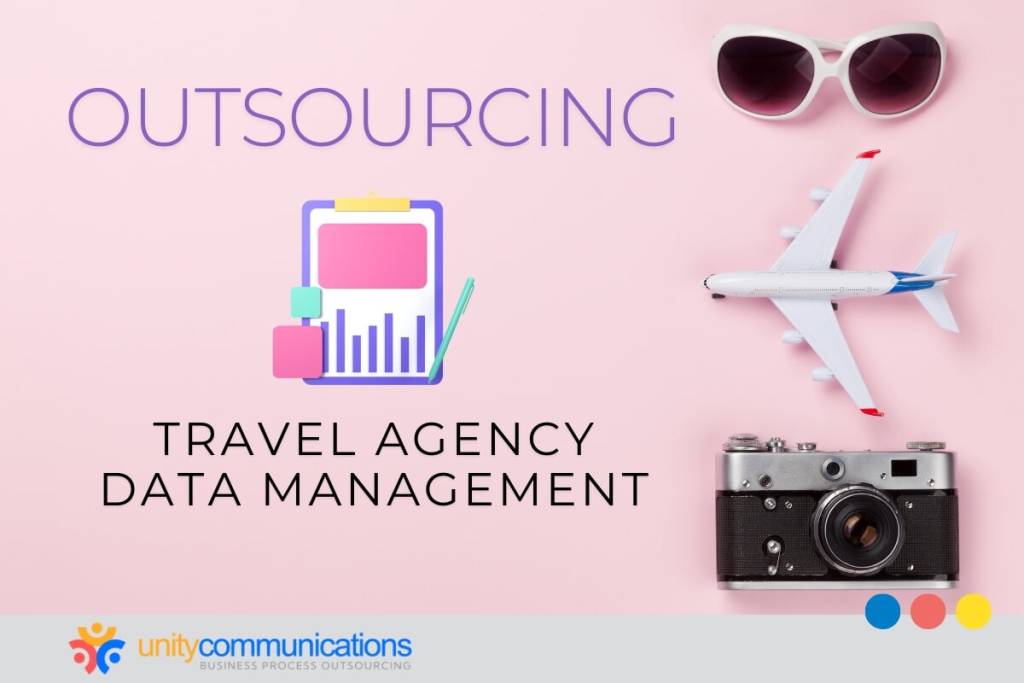IN THIS ARTICLE
Table of Contents
About 90% of travelers will pay extra fees for personalized experiences. However, finding the correct information to provide such services can be challenging, as travel agencies process massive amounts of data.
Business process outsourcing (BPO) is a cost-efficient way for travel agencies to streamline and optimize data management. It can help personalize travel experiences efficiently through improved accessibility and decision-making while enhancing compliance and security.
If you want to learn more about travel BPO for data management, this article is for you. It explores the nature of the practice and how it can benefit your travel business.
Overview of travel data management outsourcing

What is BPO? Business process outsourcing is subcontracting specific business functions to an external team that acts as an extension of your in-house staff. It is a widespread practice across industries for its cost, efficiency, and scalability advantages. According to Statista, the global BPO market revenue could reach $490 billion by 2029.
How outsourcing works for your travel agency is it provides you with a global pool of specialists in data management. The BPO company screens and trains these professionals to accomplish the following tasks at a high standard:
- Data collection: gathering information from various sources, including booking systems, expense reports, and traveler profiles
- Data cleaning and validation: ensuring data accuracy, consistency, and completeness
- Data analysis: deriving insights from travel data to optimize services and improve efficiency
- Reporting: generating reports on travel expenses, compliance, and other relevant metrics
- Policy enforcement: monitoring adherence to company travel policies and procedures
Outsourcing providers also leverage the latest technologies for effective travel data management:
- Travel management systems (TMS) provide a single platform for managing all aspects of travel, including booking, itinerary management, and expense tracking.
- Data integration platforms connect various data sources, such as booking systems, expense reports, and traveler profiles, into a centralized repository.
- Data cleaning and validation tools identify and correct errors, inconsistencies, and missing data in travel records.
- Robotic process automation (RPA) tools automate repetitive and rule-based tasks, such as data entry and report generation.
- Cloud-based collaboration platforms facilitate communication and collaboration among team members, especially in distributed teams.
- Travel expense management software simplifies expense reporting and reimbursement processes.
- Security tools implement security measures to protect sensitive travel data from unauthorized access.
Advantages of outsourcing travel data management

Effective data management and processing are the secrets to personalizing customer travel experiences, which is critical for the success of any tourism agency.
According to Zendesk’s 2023 customer experience travel and hospitality trends, 90% of travelers are willing to pay additional fees for personalized experiences. However, the same report shows that 70% of travel agents don’t know how to optimize customer data to provide such services.
Travel data also often contains travelers’ personally identifiable information (PII), which is subject to various data privacy regulations. Navigating these complexities can be challenging, especially without adequate resources.
The nature and features of BPO in travel and tourism can help you overcome these challenges. Let’s discuss its advantages in detail:
1. Reduced overhead costs
Managing travel data in-house can be costly. The average monthly base salary of a data entry clerk in the United States is already around $3,000, so how much more will it cost for higher-level roles?
One prominent benefit of BPO services is its ability to help businesses reduce costs without compromising quality. According to Deloitte’s 2023 report, 83% of companies cut costs after outsourcing.
Here are a few ways outsourcing travel data management can help you save on expenses:
- Lower labor costs: BPO providers actively recruit talent from countries with lower living expenses, resulting in lower wage ranges. For instance, the monthly salary of a data entry clerk in the Philippines is roughly $350.
- Fewer technology investments: With outsourcing providers carrying task-relevant technologies, you won’t have to worry about purchasing or subscribing to sophisticated tools.
- Minimized overhead: Outsourcing typically entails remote work, which allows you to cut on office rent, equipment costs, maintenance fees, and utility expenses.
2. Improved compliance and security
Travel BPO agents are well-versed in relevant data privacy laws, such as the General Data Protection Regulation (GDPR) and the California Consumer Privacy Act (CCPA). They also adhere to local and international information security management standards, including the Payment Card Industry Security Standard (PCI DSS) and ISO/IEC 27001.
In addition, outsourcing providers invest heavily in security infrastructure and practices to safeguard the travel data they manage. These strategies include:
- Data encryption (employing encryption techniques to scramble data, making it unreadable to unauthorized parties)
- Access controls (implementing strict access controls to limit who can view and modify data)
- Regular security audits (conducting regular security audits to identify and address vulnerabilities)
- Disaster recovery plans (having contingency plans to protect data in case of emergencies or data breaches)
3. Increased scalability and flexibility
The tourism industry encounters fluctuations in service demands due to seasonal factors, economic conditions, and other special events. Managing travel data can be challenging during high-volume months. While hiring additional in-house staff is an option, it’s not the most practical since you’re also likely to experience low-volume periods.
Outsourcing lets you scale operations without the costs of hiring and training additional team members. It offers on-demand staffing to accommodate sudden workload surges and part-time and gig workers who can occasionally assist with operations.
4. Enhanced decision-making
Outsourcing providers have access to sophisticated analysis tools and techniques that can extract valuable insights from large datasets.
- Predictive analytics uses historical data to predict trends or outcomes.
- Text analytics analyzes text data, such as customer reviews or social media posts, to extract insights.
- Data visualization presents complex data through charts, graphs, or maps to make them easier to understand.
- Artificial intelligence (AI) delivers real-time insights for timely decisions.
- Statistical software analyzes data using mathematical methods, such as calculating averages, correlations, and probabilities.
With the information, you can tailor client services and experiences. Such offers are more likely to resonate with customers, leading to higher conversion rates.
5. Boosted efficiency and productivity
Timely and accurate information is critical in the travel industry, especially for making informed pricing, inventory, and resource allocation decisions. It also ensures your agency can provide prompt and exceptional customer service and support experience.
But what is customer support experience? It’s a customer’s impression of your agency’s support team. Slow and inaccurate assistance leads to negative experiences.
Delegating this tedious task to specialized experts allows your travel agency to enjoy streamlined processes. Outsourcing teams can efficiently complete routine tasks, such as travel data entry, management reconciliation, and reporting, to provide more prompt assistance.
In addition, outsourcing providers implement rigorous quality control processes to guarantee data accuracy and consistency. This step reduces errors, which can cause delays and customer dissatisfaction.
The bottom line

Outsourcing is an invaluable strategy for navigating the complexities of travel data management. It can help your tourism and hospitality business reduce costs, improve efficiency, boost security, increase scalability, and enhance decision-making.
Altogether, these benefits empower you to provide personalized travel experiences, which give you a competitive edge in the fierce tourism sector.
Are you considering outsourcing travel data management? Let’s connect and discuss the best solution for your needs!





